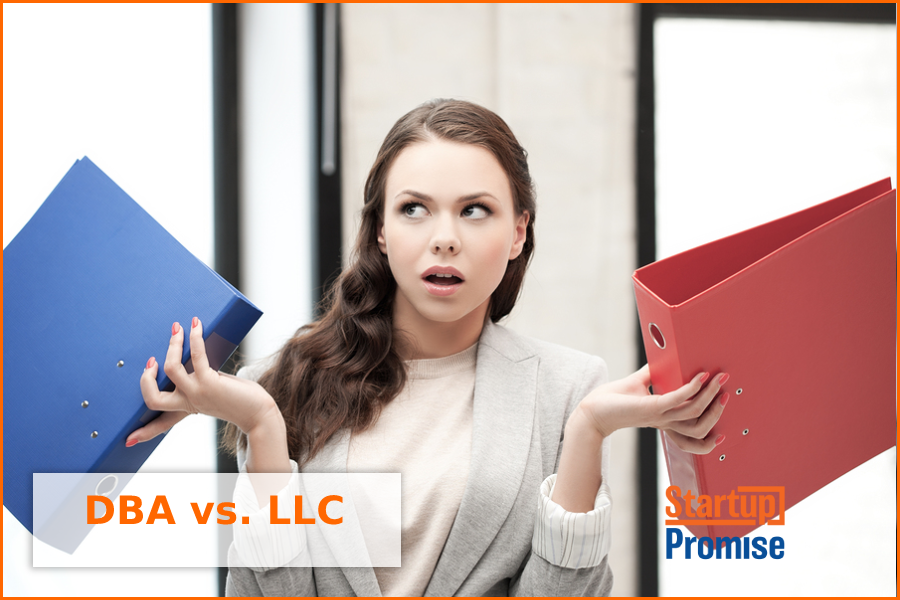- SAFE Instruments - October 10, 2023
- Startup vs Acquisition – Which is Best? - August 21, 2023
- How to Get Money to Start a Business - August 7, 2023
Once you’ve decided to start a new business, exploring the various business structures available is usually your first step. Unfortunately, for many there is a great deal of confusion regarding the differences between the DBA vs. LLC business.
One of the most common questions we are asked as advisors to business owners is “what is the difference between a DBA and an LLC?”
The short answer is “an awful lot!”


Do you have a question? Ask at the bottom of this post.
One of our advisors will answer!
The long answer to the DBA vs LLC question is spelled out here and will hopefully serve as a guide when making the important decision about the business entity structure for your new business.
This post will cover:
- What does DBA stand for?
- LLC is an acronym for Limited Liability Company
- The Differences in business income taxation between a DBA and an LLC
- Why use a DBA
- Similarities and Differences when considering the DBA vs LLC
DBA Definition
DBA is simply an acronym for “doing business as.” It is often referred to as a trade name, fictitious business name, or assumed business name.
A DBA allows an individual or business to operate under a name that is different from its legal name. For example, if John Smith wants to operate his cleaning business as ABC Cleaning, as and individual John will need to file for a DBA.
In most states, DBAs are filed at the county level where the business is located. If this is not the case, then the DBA application (or fictitious name certificate) is filed at the state where the business is incorporated.
LLC Definition
Having a limited liability company established, or LLC, means that a business is operating as a distinct and separate legal entity from its individual owners. While LLCs require more formalities than a DBA, they have fewer restrictions than corporations.
An LLC must be managed by members or a manager. Members are the owners of the company, while a manager, may or may not be a member. The LLC structure also includes more tax flexibility, as the LLC can choose to be taxed as a sole proprietor, partnership, or corporation.
To form an LLC, business owners must file articles of organization at the state level and adopt a Member(s) Operating Agreement.
What does a DBA Intend to Accomplish for a Business Owner?
Filing a DBA allows a business owner to use a name other than their legal name to operate their business. An individual who files for a DBA to operate their business is operating their business as a sole proprietor — not as a business entity. The business, and all of its assets and liabilities, belong to the individual who files for the DBA.
Filing for a fictitious name can be beneficial to a business entity is possible as well. When this is done, typically it’s for the purpose of developing a separate and recognizable brand from the official name of the business entity.
When a DBA is filed for by either an individual or a business entity, it allows the individual or business owner to open a business bank account in the fictitious name so payments may be made payable to the fictitious name of the business.
How is an LLC Similar to a DBA?
Both LLCs and DBAs allow business owners to name their business something other than their own individual or business’ legal name.
How is an LLC Unlike a DBA?
The biggest difference between a DBA and an LLC is liability protection.
Under a DBA, there is no distinction between the business owner and the business. The business owner is liable for all expenses incurred on behalf of the business. On the other hand, an LLC provides limited liability protection. The business owners’ personal property remains completely separate from the business.
In addition, a DBA does not provide any tax benefits. As an LLC, owners can choose a corporate structure such as an S-corporation that receives special tax treatment.
And last, but not least, in most states where you form an LLC, there is a requirement to file an annual report and in certain circumstances pay an annual fee. Whereas, fictitious name certifications, which provide you with the right to use a DBA, typically has a one-time filing and fee in most states.
Is it Ever Appropriate to Create an DBA for an LLC?
Yes, an LLC may benefit from the ease of DBA filing when the company wants to expand into new products or services.
For example, if John Smith’s cleaning company were ABC Cleaning, LLC and he decided he wanted to expand into selling cleaning supplies online, he could file a DBA for his new project “ABCCleaningSupplies.com” that would be protected under the original LLC.
A DBA allows an LLC to broaden its offerings without creating a new LLC or corporation for each division.
Are There Other Ways to Protect Your Business?
Yes, absolutely. If you intend to have additional brand names for your business, create a website with a name that differs from your official, legal name or create other intellectual property, there are other steps to consider taking.
We’ve got a post on this topic here where you may learn more about protecting your business’ name.
You also may find our Starting a Business Checklist useful.


I already have an LLC regarding Cleaning, I am contemplating another business, (has nothing to do with cleaning) do I fill for a DBA under the already established LLC or do I need create a separate LLC for the contemplated business?
Hi Leslie,
If you want to have separated liabilities and assets for your new business, using a fictitious name (or DBA) won’t work.
So the answer to your questions is ‘it depends on whether you want legal, tax, asset and liabilities for your new business to be separated from your existing LLC.
Hope this helps…
I want to lease my business to another person but want to keep the business trade name. Can I do so ?
Hi AGF,
Leasing is related to real property, not a business operation or enterprise. So, no.
It may be possible to lease (or sub lease) the real property from which your business operates to another party. Generally, that requires permission from the landlord.
As for your business trade name, that’s an intangible asset that you can retain and if you choose to do so, you can license it to other parties.
If I haven’t answered your question, try again!
All the best…
Where do I file for an LLC
Hi Debra,
Filing for an LLC is done at the Corporations office in the state in which you want to form your business.
Here’s a filing service to form new business many of our clients have used with success.
All the best…
I have three business models. One is in the survival outdoors genre, the other two are food delivery and courier business. My son and I were going to form a general blanket LLC and run the other models as a DBA, however I am hearing that doing so may leave the food delivery and courier business at risk. Should I simply llc the food delivery business as well?
Hi Roger,
If you choose to form one business entity (LLC or any other type of entity), any line of business you add to it (even if you file for a fictitious name – DBA), will be part of the LLC. In such a situation, there is no separation between the lines of business.
One business, one set of risks. If something goes wrong with one of the lines of business (again, LLC or DBA) if part of the LLC, then the LLC is in jeopardy.
So, what you choose to do really depends on how comfortable you and your son are with combining the risks.
Hope this helps…
Hello,
I recently received my LLC. My husband said I needed to get a DBA. I noticed by research the DBA doesn’t allow my business to be fully protected, but the LLC will. Do you think you I really need the DBA?
Hi Sandra,
If you formed an LLC for your business, then you have an official, legal tradename to use for marketing purposes.
If you want your LLC to use a tradename that differs from its tradename, then your LLC would need to file for a fictitious name so it may Do Business As (DBA) another tradename.
If you choose to take these two steps (form an LLC and then the LLC files for a DBA), your LLC has certain legal protections. The fact that the LLC has a fictitious name assigned to it will not affect the LLC’s legal status and protections.
It’s not clear to me why your LLC would need a DBA.
If there is more to your situation, let me know.
Hope this helps a bit…
Hello,
My mother is wanting to start a business but cannot have it in her name. She is wanting me to file a DBA and she will be taking care of the business herself. Would it be better to do a LLC for the business in this case? Considering I am not going to be a worker or manager in the business. Or is there something else I could do it as for more protection on my part? Also if I do this what will I have to do on my taxes going further?
Hi McKinley,
It’s not a good idea to allow another person, even if she’s your mother, to use your identity to do anything — especially own and operate a business. You’d be liable if something goes wrong.
A DBA (fictitious name certification) offers you no personal liability protection whatsoever. And by filing for the fictitious name on your mother’s behalf would not be truthful.
You could choose to form an LLC or other type of business entity, which would mean you owned the business and the taxable income or loss would be attributable to you, not your mother.
Some things to carefully consider…
All the best…
Hi! Our company, let’s just call it Blue to be simple just became an LLC. We’d like to continue just using our same logo, advertising as Blue. Can we be Blue LLC and DBA as Blue? Do we have to file any differently? I’m new at this.
Hi Christie,
I need to break down what you’re asking and clarify what I believe you’ve done and intend to accomplish…
I assume you have been operating a sole proprietorship called Blue.
You may or may not have filed individually for the fictitious name ‘Blue’ (a DBA) in the past. We’ll cover that in a minute.
If you as an individual (or a group of individuals) formed an LLC called Blue, LLC, you now have a business entity and you’d like to assume all of the customers, logo, marketing materials, etc. related to your former sole proprietorship.
Yes?
If so, then you will need to contribute or assign the assets related to ‘Blue’ (sole proprietorship) to the Blue, LLC business entity. Whatever the value of these assets may be is recorded as assets on Blue, LLC’s balance sheet.
Now, if you initially filed a DBA for ‘Blue’ as a sole proprietor, you will need to terminate the DBA certificate and then Blue, LLC would apply for it.
If you did not file for a DBA for ‘Blue’ as a sole proprietor, then termination is not necessary and the Blue LLC will need to file for Blue as a fictitious name (DBA).
Let me know if I’ve answered your question!
All the best…